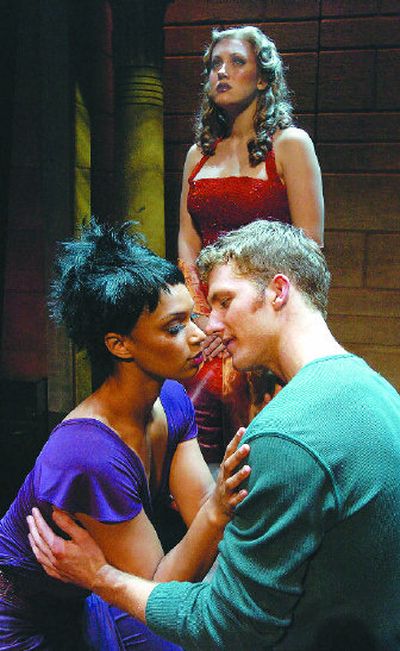‘Aida’ meets ‘Lion King’

Elton John and Tim Rice’s “Aida” is based loosely on the Verdi grand opera of the same name, but don’t expect this Aida to know much about that “Aida.” “I’m not familiar with the opera,” said Marja Harmon, who plays Aida in the touring Elton John version, which opens tonight at the INB Performing Arts Center.
“But I do know that the story and the foundations are pretty much the same. Except this is much more contemporary and has the Disney twist at the end.”
The plot of both the old and new “Aida” can be roughly described like this: The Nubian princess Aida falls into forbidden love with Radames, a soldier of Egypt. Unfortunately, the Egyptian princess Amneris also loves Radames. Complicating matters further is that Egypt has enslaved Aida’s people for years.
“Aida has to juggle between her forbidden love and her love of her people,” said Harmon, a 2005 graduate of the University of Southern California’s theater and music program. “She ends up having a conflict between her duty and her desire.”
The similarities between the Verdi and Sir Elton versions end there, especially when it comes to the music. Don’t expect any arias.
“John and Rice have done such a great job with the scoring, encompassing rock, pop, R & B and gospel,” said Harmon.
The nine-piece orchestra which travels with the show includes a pair of guitarists to go along with the strings and winds.
You can expect even a nod to John’s old hit, “Crocodile Rock.” After all, the story does take place on the Nile, the land of slithering crocs.
Verdi’s opera was first performed in 1871 at the Khedivial Opera House in Cairo. The composer was inspired by recent archeological discoveries about the glories of the pharaohs.
Some productions have even used live elephants on stage, to evoke ancient Egypt. In this “Aida,” however, the setting is not nearly so ancient.
“It starts out in the present day, and then they go back in time as the story evolves, and then it ends in the present day,” said Harmon.
“The dream sequences take place in Egypt or modern-day Sudan, which is Nubia, but the sets and costumes are very conceptual. But they do suggest Egyptian.”
John and Rice had already scored a hit Disney collaboration with “The Lion King” when they began this pop version of “Aida.”
The original 1998 debut opened in Atlanta and was titled “Elaborate Lives: The Legend of Aida.” The show was revised, remounted, renamed and taken to Chicago in 1999. It arrived on Broadway in 2000, where it ran 1,852 performances before closing in 2004.
It won four Tony awards, including Best Original Musical Score for John and Rice, and Best Actress for Heather Headley, who played Aida.
Millions of people, far from New York or Chicago, heard the music on the radio as well. “Aida” spawned two hit songs, “Written in the Stars,” recorded by John and LeAnn Rimes, and “Easy as Life,” recorded by Tina Turner.
This non-Equity (nonunion) national tour, developed by Big League Theatricals, began in September and is currently the only “Aida” tour in the U.S.
“Our touring version is not identical (to the Broadway version),” said Harmon. “Our director has put a nice contemporary spin on it. For instance, we use guns instead of swords.
“Yet in terms of sets and costumes, this tour is absolutely gorgeous. The spectacle of the show is wonderful; we have these giant brushed-aluminum portals – pedestals with different Egyptian artifacts on top of them – that move to create different scenes.”
She said the audience response so far has been “absolutely overwhelming.”
Harmon’s favorite song is “The Gods Love Nubia,” a gospel-based number that involves nearly the entire 26-person ensemble. She called it a heartfelt number with “a lot of passion.”